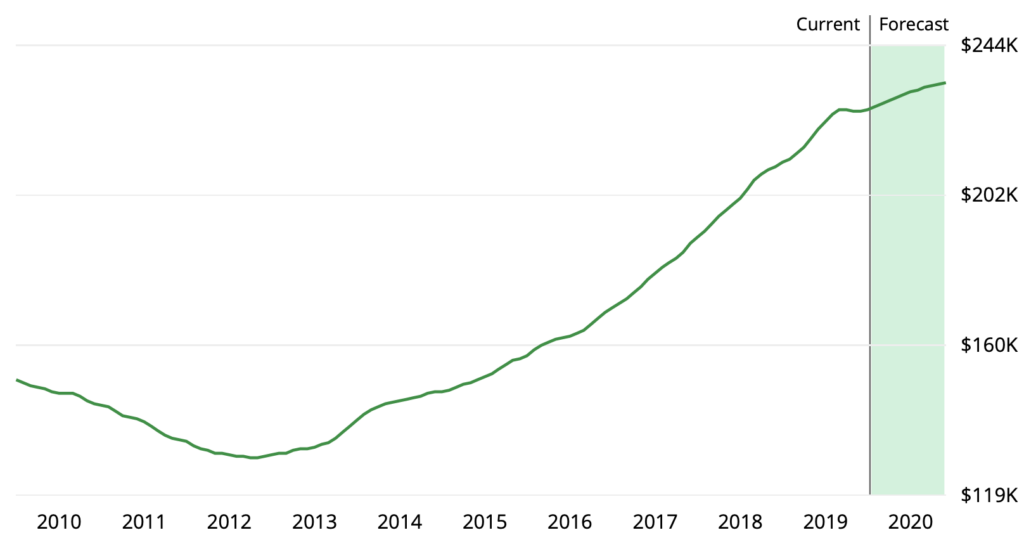
The latest predictions for the Charlotte, North Carolina real estate market suggest that home prices could rise more slowly over the months ahead.
The research team at Zillow, for example, predicted that the median home value for Charlotte would rise by 3.6% over the 12-month period ending in July 2020. That’s down from an actual gain of 7.3% over the previous 12 months.
As of July 2019, the median home price in Charlotte, North Carolina was around $226,000.

The chart above, provided by Zillow, shows the median home value for the Charlotte real estate market over the past ten years or so. As you can see, house values in the area started to rise steadily in 2013. Appreciation continued for several more years, before leveling off a bit in 2019. The company’s forecast is shown in the green shaded area.
In a sense, this cool-down could be viewed as a kind of “normalization” or market correction. Over the past few years, home prices in many cities across the country rose faster than usual and outpaced wage growth by a considerable margin. Now, we are starting to see a slowdown in price growth nationwide.
Given the current supply and demand situation within the Charlotte metro-area real estate market, it’s no surprise to see forecasts suggesting additional gains through 2019 and into 2020. While this housing market has cooled a bit over the past 12 to 18 months, it’s still fairly active with steady demand from buyers.
Real Estate Inventory Remains Tight
Like many cities across the U.S., the Charlotte housing market is suffering from a shortage of supply in 2019. This trend could carry over into 2020 as well, putting upward pressure on home prices.
As of June 2019, the Charlotte metro area had less than a three-month supply of homes for sale. That’s considerably lower than the five- to six-month supply level economists consider to be “neutral” or balanced.
So, from an inventory standpoint at least, the Charlotte real estate market still tends to favor sellers over buyers. And yet…
Slower Home Sales in 2019?
Supply levels don’t tell the full story. When you consider how long it takes for a typical home to sell in this area, you begin to see a different picture. When measured by the median number of “days on market,” the Charlotte housing market is actually a big sluggish right now (as of summer 2019).
In May 2019, homes listed for sale in the area spent a median of 43 days on the market before going under contract. That was slightly higher than the national median number of days on market for the same timeframe. So we’re not talking about a fast-moving real estate scene.
This is another trend we’re seeing in housing markets across the country. In many U.S. cities, homes are sitting on the market longer in 2019 (when compared to 2017 and 2018). Sellers are having to work harder. Price cuts are more common. In many areas, conditions are starting to shift in favor of buyers.
Major Population Growth in Charlotte
Charlotte real estate market forecasts vary slightly from one source to the next. But the general consensus appears to be that home values will continue to rise over the coming months. Population growth has something to do with this, as it brings more buyers into the market.
According to the U.S. Census Bureau, the city of Charlotte’s population rose by a whopping 18.6% from April 10 to July 2018. That was a much bigger gain than most other U.S. cities during the same period, and triple the growth rate for the nation as a whole.
Significant population growth increases demand for housing on both the rental and purchase side. And this comes at a time when inventory remains limited in and around this city. This is partly why forecasts for the Charlotte real estate market predict continued home-price growth into 2020.
This city appears to be particularly popular among millennials. In 2017, the personal finance website SmartAsset reported that Charlotte, North Carolina was one of the top destinations for relocating millennials. The company used data from the U.S. Census Bureau and “compared the number of persons between ages 20 and 34 moving into a city and compared it to the number moving out of the city.”
Granted, that study is a bit dated. But the overall trend it identified remains valid and relevant. This city — and its broader metro area — has attracted new residents from all across the country. That increases demand for housing and puts upward pressure on home prices.
Disclaimer: This article includes forecasts and projections for the Charlotte real estate market through 2019 and into 2020. Those predictions were provided by third parties not associated with our company. MetroDepth makes no claims or assertions about future housing conditions.
Source: MetroDepth
Photos credit to the owners
Follow us:
IG: southcrestrealty
Twitter: southcrest2012
Facebook: SouthCrest Realty